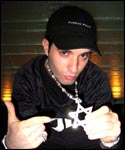 Some call him Shek. Others call him Chamishim, the Hebrew word for fifty. To his growing crowd of fans, he is 50 Shekel, the hottest name in Heeb-Hop. Using an obvious play on the name of the popular rapper 50 Cent, 50 Shekel (the shekel is the form of currency in Israel) hopes to forge a link from Jewish teens to their ancient faith.
Some call him Shek. Others call him Chamishim, the Hebrew word for fifty. To his growing crowd of fans, he is 50 Shekel, the hottest name in Heeb-Hop. Using an obvious play on the name of the popular rapper 50 Cent, 50 Shekel (the shekel is the form of currency in Israel) hopes to forge a link from Jewish teens to their ancient faith.Aviad Cohen, the 28-year-old Israeli-American mastermind behind 50 Shekel, never intended to be a role model, despite his early attraction to entertainers with a positive message. Instead, he says, his act grew out of a deep love for Judaism's long tradition of keeping history alive. Rap, he says, is "a great storytelling medium."
Along the way, Shekel seems to delight in making witty parallels to mainstream rap, throwing around the term "chewitz" (short for Manischewitz, a Passover wine), the way cognac appears on traditional rap albums. "You can find me in da shul, praying after school/ Honey I got the chewitz if you're jumping in my pool." Shekel raps, "I'm just into making peace, I ain't into causing trub/So come give me a hug, if you're into getting love."
"'In da Club' inspired me to do something with rap," Cohen says. "50 Cent talks about what he knows. I choose to talk about what I know."
Mixing pop music and religion is nothing new. The Christian music industry has created major stars Amy Grant and Michael W. Smith and music generates nearly 20 percent of Christian outlets' sales. Shekel's predecessors in Jewish music include bands like 2 Live Jews and Craig Taubman, who combines traditional themes with a modern sound.
Raised a Conservative Jew in Tel Aviv and Brooklyn, Cohen moved to Los Angeles about seven years ago, hoping to go into entertainment. He landed a job as a directors assistant and post-production supervisor, working on music videos for Christina Aguilera and other top artists.
"I was sitting around in Los Angeles one day and I was like 'How come there are so many creative people who are Jewish and are known but nobody's really talking about things that I could relate to? Nobody. They don't talk about the Torah. Nobody is speaking out for us."
At one point, Cohen even thought about changing his name to fit into show business better but had reservations because he thought it would change his identity. "Judaism is what made me--all the values and ethics that the Torah teaches. That's something that's been evident in my life.
Today, Cohen is in what he calls "Jew rehab." He is attracted to Orthodox Judaism and is, he says, in the process of becoming closer to the Torah and observance. In the last eight months or so--since Cohen has taken on his 50 Shekel persona--he has become deeply involved in educating the "New Jew Generation."
50 Shekel, he says, is just starting to take off. Cohen has only recently hired a manager and is still finishing his debut album, "Enter the Spiel," which will include a "Heebonics" dictionary and is due out in the Spring. Meanwhile, he says, he has been bombarded with emails and booking requests through his website. "I get all this fan mail from these kids. It's empowering them. The best part is, when I get all these kids who email me, all these adults who email me, I don't feel so much alone as a Jew."
Originally, Cohen planned to add a female sidekick to the act, whom he had already named "Lil' Spenda," but has stopped looking for her because he found himself getting too personally involved with the search. A female counterpart, he adds, should ideally be his wife, since they would be spending so much time together. The album will feature one special female: his 10-year-old cousin, Devorah, or "Lil' D." As 50 Shekel raps about "poppin' the chewitz," Lil' D will rap about "poppin' the Kedem" (grape juice).
Though Cohen says almost all of his feedback from the Jewish community has been positive, he does get occasional flak for use of the word J.A.P, an acronym for Jewish American Princess. "It's not that it's a bad thing," he says. "I think women are princesses before they get married. Once they get married, they're queens. So maybe some girls kind of dirty up that image by being snotty and obnoxious, but they're not going to ruin it for the rest of my Jewish American Princesses."
After the album is finished, Cohen plans to turn all his energy toward his dream of creating a Jewish entertainment company. "I will not stop doing this. I will keep doing this forever or until G-d decides that I should take a hiatus-a Hebrew hiatus as I call it. I am of service to G-d.
"I'm always going to be me and part of being me is being a Jew. So instead of changing everything and hiding from being a Jew, I decided to completely do the opposite, embrace it and not just embrace it, but speak out for our culture. It's about celebrating the culture and celebrating the Jew life. I'm Jewing my best to make a difference, one rhyme at a time."

